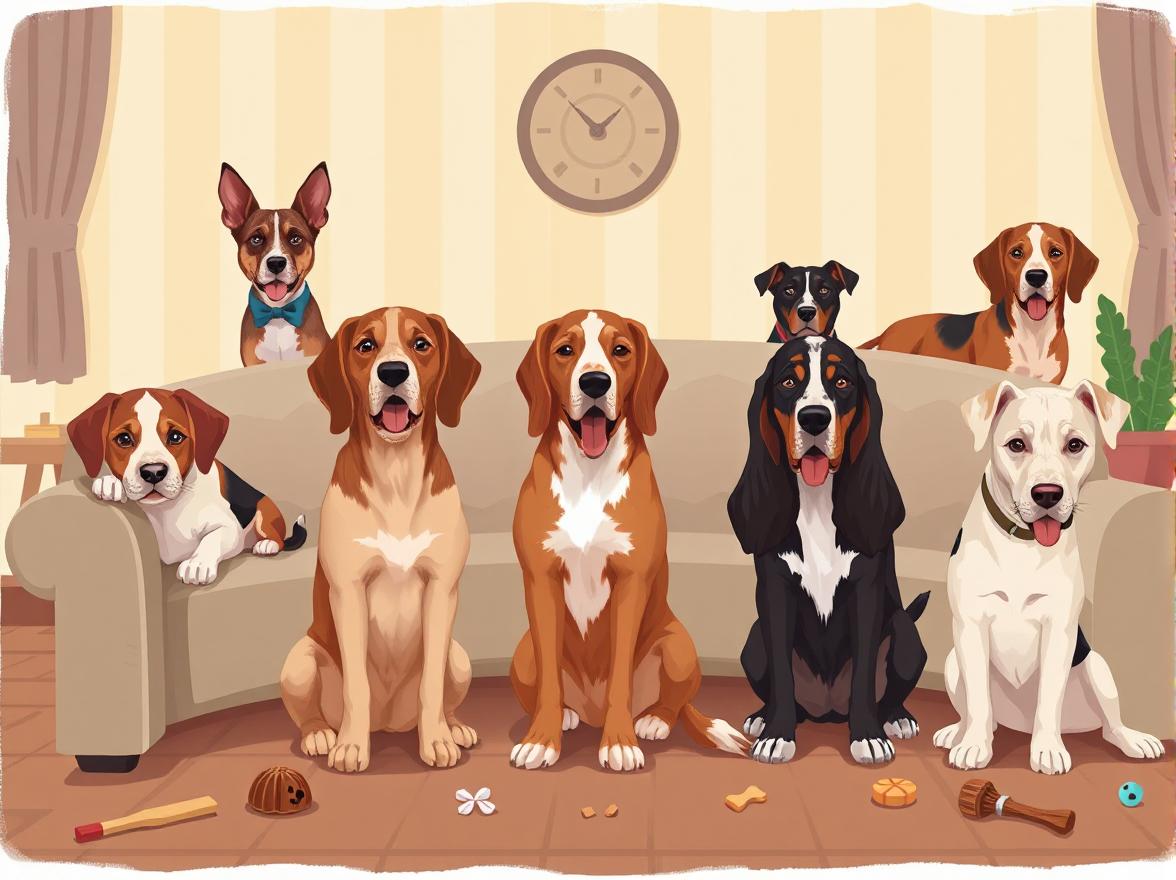Top 10 Dumbest Dog Breeds – Unveiling the Least Intelligent Canines
When it comes to choosing a dog, intelligence plays a big role. However, some dog breeds have a reputation for being a little less, well, “brainy.” But don’t let that fool you! Intelligence in dogs doesn’t always correlate with being a good companion. While some breeds might not ace obedience training or pick up tricks quickly, they often make up for it with their unique personalities, affection, and loyalty.
In this blog post, we’ll explore the top 10 dumbest dog breeds based on general intelligence and trainability. But remember, a dog’s “dumbness” shouldn’t define them—they can still make wonderful pets! Let’s take a lighthearted look at these lovable, often misunderstood breeds.
1. Afghan Hound
Why They’re Considered Dumb:
Afghan Hounds have earned a spot on many “dumb dog” lists due to their aloof and independent nature. They’re often described as “cat-like,” preferring to do their own thing rather than listen to commands. This breed doesn’t take well to obedience training, and their stubbornness can sometimes make them seem a bit slow-witted.
Personality:
Despite their reputation, Afghan Hounds are incredibly graceful, affectionate, and independent. They are also known for being excellent hunters with a keen sense of smell.
Tips for Training an Afghan Hound:
- Use positive reinforcement with treats and praise.
- Keep training sessions short and fun to hold their attention.
- Be patient and consistent, as they are not quick to please.
2. Basenji
Why They’re Considered Dumb:
Basenjis are independent dogs with a strong sense of self. These dogs are notorious for being difficult to train because they are not highly motivated by food or praise. They are also known for their “yodeling” rather than barking, adding to their quirky and sometimes misunderstood nature.
Personality:
Basenjis are energetic, alert, and playful. They are very clean dogs and often groom themselves like cats, adding to their independent charm.
Tips for Training a Basenji:
- Train with consistency, using firm commands.
- Be prepared for some resistance—these dogs like to think for themselves.
- Reward with things they enjoy, like playtime, as treats might not be effective.
3. Chow Chow
Why They’re Considered Dumb:
Chow Chows are often viewed as stubborn and aloof. They tend to do their own thing and are not highly motivated by food or treats. Their independent nature can make training difficult, and they may appear “dumb” to those expecting a quick learner.
Personality:
Chow Chows are strong-willed, calm, and can be quite aloof with strangers. Despite their independent streak, they can be affectionate with their families and make great loyal companions.
Tips for Training a Chow Chow:
- Establish yourself as the firm but loving leader.
- Keep training sessions calm and consistent.
- Don’t rely solely on food rewards—this breed may need other incentives like attention or playtime.
4. Bulldog
Why They’re Considered Dumb:
Bulldogs have a reputation for being slow to respond to training. Their laid-back, “I’ll do it when I feel like it” attitude can make them seem less intelligent. However, their willingness to please their owners means they can still learn, even if it takes a little longer.
Personality:
Bulldogs are affectionate, loyal, and sometimes downright goofy. They tend to be calm and lazy but love being around their people, often acting as couch potatoes.
Tips for Training a Bulldog:
- Keep sessions short and positive.
- Don’t push them too hard—Bulldogs work at their own pace.
- Use patience and make training a fun experience for both you and your dog.
5. Basset Hound
Why They’re Considered Dumb:
Basset Hounds are slow-moving and stubborn, and this can sometimes lead to a perception of low intelligence. While they are excellent scent hounds, their inclination to follow scents rather than obey commands can make them challenging to train.
Personality:
Basset Hounds are friendly, laid-back dogs that are great with families. They are loyal and affectionate but often prefer to relax rather than engage in rigorous training.
Tips for Training a Basset Hound:
- Make use of their strong sense of smell during training to keep them engaged.
- Use treats or their favorite toy as motivation.
- Be patient, as they may get distracted by scents or their own stubbornness.
6. Shih Tzu
Why They’re Considered Dumb:
Shih Tzus are charming, but they can be somewhat independent and stubborn when it comes to training. Their selective hearing and desire to do things on their own terms can make them seem “dumb” at times.
Personality:
Shih Tzus are affectionate, friendly, and often act as though they are royalty. They are great companions, especially for people who want a small, laid-back dog.
Tips for Training a Shih Tzu:
- Use gentle but firm training methods.
- Be patient and consistent, as these dogs can be easily distracted.
- Incorporate play into training sessions to keep them engaged.
7. Greyhound
Why They’re Considered Dumb:
Despite being one of the fastest dog breeds, Greyhounds aren’t particularly known for being trainable. Their calm demeanor and lack of interest in training often lead to the perception that they aren’t the brightest. They can also be quite independent and enjoy spending time lounging rather than working on tricks.
Personality:
Greyhounds are gentle, calm, and affectionate dogs. They love lounging but also have bursts of energy when it’s time to run. They tend to be great with children and other pets.
Tips for Training a Greyhound:
- Keep training sessions short and relaxed.
- Use positive reinforcement to encourage them to participate.
- Be patient, as they are not motivated by typical training rewards.
8. Pekingese
Why They’re Considered Dumb:
Pekingese dogs can be a bit aloof and stubborn, making them hard to train. They often have a “royal” attitude, refusing to engage unless they feel like it. This independent nature can make them seem less intelligent, even though they are not dumb—they just don’t feel the need to prove it.
Personality:
Pekingese dogs are loyal, affectionate, and often display a lot of personality in their small bodies. They are independent and confident but can be great companions when treated with respect.
Tips for Training a Pekingese:
- Be patient and use positive reinforcement.
- Keep training sessions lighthearted and fun.
- Don’t push too hard, as they are not quick to obey.
9. Mastiff
Why They’re Considered Dumb:
Mastiffs are huge dogs that can sometimes be perceived as slow learners due to their calm, laid-back nature. They are often more interested in lounging and protecting their territory than performing tricks or following commands.
Personality:
Despite their size, Mastiffs are gentle giants. They are loyal, protective, and calm, making them great companions for families. They are also known for being very affectionate and loving.
Tips for Training a Mastiff:
- Keep training sessions relaxed and enjoyable.
- Be consistent and patient—these dogs need time to process commands.
- Use a calm, firm approach to training.
10. Irish Wolfhound
Why They’re Considered Dumb:
Irish Wolfhounds, though massive in size, are known for their calm demeanor. While they’re excellent hunters, their laid-back attitude often leads people to assume they lack intelligence. They are not as eager to please as some other breeds, and this can make them seem less trainable.
Personality:
Irish Wolfhounds are gentle giants. They are calm, affectionate, and great with families. They may not be the fastest learners, but they make up for it with their affectionate and loyal nature.
Tips for Training an Irish Wolfhound:
- Keep training sessions calm and positive.
- Use consistency and patience to help them learn.
- Provide plenty of praise and rewards when they succeed.
Conclusion
While some dog breeds may not rank high on intelligence charts, this doesn’t mean they aren’t capable of providing love, loyalty, and companionship. In fact, many of the breeds listed above are known for their affectionate nature, despite their apparent lack of trainability.
When selecting a dog, it’s important to remember that intelligence is only one aspect of a dog’s personality. Each dog has its own unique traits, and what they lack in intelligence, they often make up for in charm and heart.
The key to a happy relationship with any dog, whether they’re on the list of “dumbest” breeds or not, is understanding their nature and working with them patiently. By using the right training techniques and having realistic expectations, you’ll be able to enjoy a fulfilling relationship with your canine companion.





